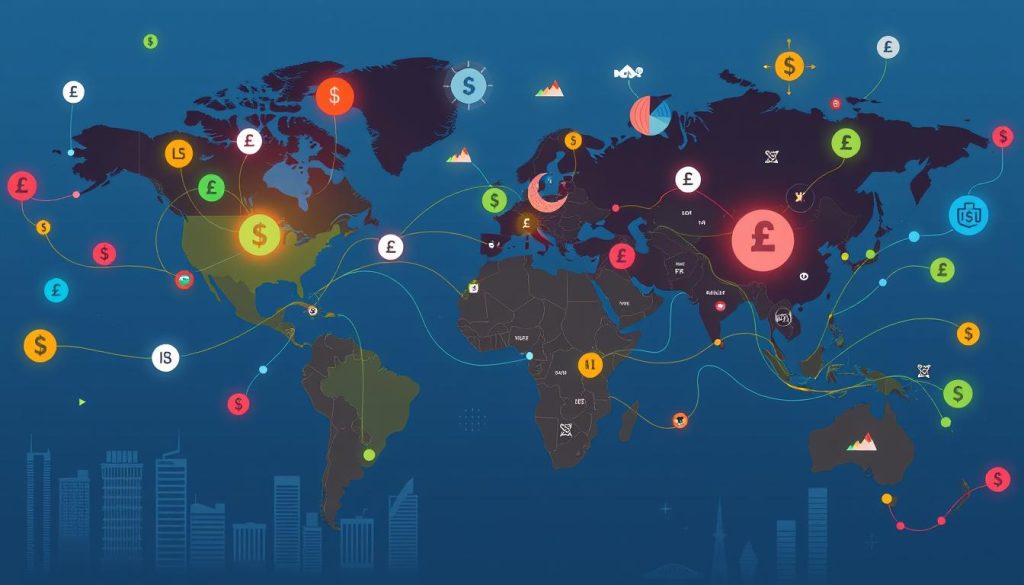In today’s world, managing money across borders is key for businesses and people. International financial management deals with global money operations, investments, and risks. It involves understanding different countries’ financial rules and currency values.
Good international financial management helps companies avoid risks and make more money. It’s about knowing how to handle money in a global setting. This knowledge helps in making smart financial plans.
Key Takeaways
- International financial management involves the strategic oversight of financial activities across national borders.
- It encompasses the management of global financial operations, investments, financing, and risk management for multinational corporations, governments, and financial institutions.
- Effective international financial management helps businesses mitigate risks, optimize capital structure, and increase revenue and cash flow in a global context.
- Understanding the fundamentals of international finance, global investment strategies, and cross-border risk management is crucial for success in this field.
- International financial management skills are essential for businesses and individuals in a globalized world, with online courses available to enhance these capabilities.
Understanding the Fundamentals of International Finance
International finance is complex and ever-changing. It involves global markets and big companies. Knowing the basics helps us understand how money moves around the world.
Basic Concepts and Principles
Key ideas in international finance include foreign exchange rates and interest rates. These help manage money and risks across borders. Knowing these basics is key for success in global finance.
Role of International Financial Markets
Global markets help with money movement and investments. They let big companies and governments work together. These markets change a lot, so it’s important to keep up.
Key Players in Global Finance
Many groups play big roles in global finance. This includes big companies, governments, and banks. They all help shape the rules and flow of money worldwide.
Learning about international finance is like solving a puzzle. It helps us understand the complex world of money. By knowing the basics and who’s involved, we can tackle global finance challenges.
| Key Concepts | Importance |
|---|---|
| Foreign Exchange Rates | Crucial for valuing assets, managing risks, and facilitating cross-border transactions |
| Interest Rate Parity | Describes the equilibrium relationship between interest rates and exchange rates |
| Purchasing Power Parity | Used to compare the absolute purchasing power between different currencies |
“The rapid globalization of the world economy has made international financial management a critical part of the job for nearly every major corporation.” – Cheol S. Eun, leading expert in international finance
Understanding the basics and who’s involved in global finance is key. It helps us manage money and risks better. This is important for big companies and investors worldwide.
Global Investment Strategies and Portfolio Management
As an investor, I know how key it is to make the most of global investments. Today’s world is all about being connected. So, knowing how to manage your portfolio globally is key to long-term success.
Diversifying is a big part of global investing. By spreading my investments across different countries and types, I can lower risks. Also, managing currency risks is important to keep my investments strong.
Managing a global portfolio well means knowing a lot about markets and rules around the world. This knowledge helps me make smart choices. It lets me get the best returns while keeping risks low.
I’ve been looking into the Investment and Portfolio Management Specialization at Rice University. It teaches a lot about how to invest wisely. Topics include how to spread out investments, manage risks, and understand how people make financial choices.
By staying up-to-date, diversifying, and improving my strategies, I’m sure I can reach my financial goals. I’m ready to handle the changes in international markets.
As I keep working on my global investments, I promise to stay quick and informed. With smart strategies and discipline, I’m confident I can make the most of international markets. And I’m looking forward to a bright financial future.
Managing Foreign Exchange Risk in Multinational Corporations
As companies grow globally, handling foreign exchange risk is key. Changes in currency value can hurt profits and cash flow. It’s vital for companies to know their currency exposure, use smart hedging strategies, and check risks well.
Types of Currency Risk Exposure
MNCs face three main currency risk exposure:
- Transaction exposure happens when buying products in another currency. If that currency gets stronger, costs go up.
- Translation exposure comes from converting foreign money into the company’s money. This can change financial reports.
- Economic exposure affects a company’s value, especially for those with big foreign operations.
Hedging Techniques and Tools
To lower foreign exchange risk, companies use different hedging strategies:
- Forward contracts: Secure exchange rates for future deals.
- Currency options: Buy the right to buy or sell a currency at set rates.
- Currency swaps: Swap one currency for another, with a promise to switch back later.
- Natural hedging: Match money coming in and going out to lessen risk.
Risk Assessment Methods
Good currency risk management needs a full risk check. Companies should watch cash flow, study big economic trends, and change their plans as needed. By managing foreign exchange risk well, companies can make their finances more stable and strong globally.
“Effective currency risk management helps protect profit margins for multinational corporations by managing the impact of currency fluctuations on costs and revenues.”
Cross-Border Capital Structure and Financing Decisions
Managing money across borders is a big challenge for companies. They need to mix debt and equity well to save money and avoid risks. They must think about exchange rates, taxes, and rules in different places.
Using local money can help avoid big risks. This way, companies can match their money and debts better. A central team can help manage money, risks, and different currencies.
- Cross-border financing helps fund activities in other countries, often with help from private equity and banks.
- Cross-border factoring gives quick cash by selling what others owe you, helping with money flow.
- But, there are big risks like changes in currency value and political issues that can hurt deals.
Even with risks, cross-border trade and financing are key for growing globally. By smartly managing their capital structure and money, companies can reduce risks and find new global financing sources.
https://www.youtube.com/watch?v=c7-3Ma_vmXw
More companies are doing business across borders because it’s cheaper and opens up new markets. But, they face tough challenges like rules on money and political issues in other countries.
“Cross-border financing is a crucial tool for companies looking to expand their global footprint, but it requires careful management of currency and political risks.”
International Financial Management: Core Components and Practices
Managing money well is key for businesses worldwide. Three important areas are global treasury management, working capital optimization, and international cash flow management.
Treasury Management
For big companies, managing money across borders is crucial. It helps cut down on costs from changing money and sending it. By making money management better, companies can save money and control their finances better.
Working Capital Optimization
Managing money well in different places means handling inventory, money owed to you, and money you owe. You need to know about global supply chains and how people pay. This helps keep money flowing and avoids problems.
International Cash Flow Management
Good international cash flow management means planning and forecasting money well. It helps keep enough money in different places and markets. Using methods like pooling and netting helps manage money better and avoid risks from changing exchange rates.
Learning these key parts of managing money globally helps companies grow. It makes them more competitive, resilient, and opens up new chances for success.
“Proper management of international finances can help organizations achieve efficiency and effectiveness across markets, enhancing sustainability and competitiveness.”
Transfer Pricing and Tax Considerations in Global Business
In the world of international finance, transfer pricing and taxes are key. Transfer pricing is about setting prices for goods and services between related companies. It’s a big deal for big companies.
Taxes in global business mean knowing many tax rules. It’s about planning taxes well to save money and follow laws. But, it’s hard, as 72% of companies struggle with tax in their systems.
Companies need strong transfer pricing rules and better data. The survey shows 76% need clear rules, 47% need to organize data, and 36% need better data quality. Also, 88% think new tech will save them money in three years.
Transfer pricing and taxes need smart planning to avoid risks. Keeping up with rules and using data helps companies save on taxes. This makes their global tax plans better.
Good international taxation, transfer pricing, and global tax strategies are very important. As companies grow, understanding these areas is key for success.
“Organizations reported saving 30% of all hours spent on TP-related matters in the finance department over a five-year period after managing transformations.”
By tackling global tax planning and using new solutions, companies can grow. They can handle international taxation, transfer pricing, and global tax strategies well. This helps them succeed in the changing world market.

International Banking Operations and Offshore Finance
The world of international banking is complex. It includes global banking systems, different payment methods, and strict rules. Knowing these things helps you make smart choices and use international banking and offshore finance wisely.
Global Banking Systems
Global banking systems help with money moves across borders. They let people and businesses handle money in different places and currencies. With these systems, you can manage your money better, no matter where you are or what you do.
International Payment Methods
- Wire Transfers: Quick and safe money moves, great for big deals.
- Letters of Credit: A way to pay that makes sure the seller gets paid, safe for both sides in deals.
- Electronic Funds Transfers (EFTs): Fast and cheap way to move money between accounts, good for international payments.
Regulatory Compliance
Understanding the rules of international banking is key. Banks must follow laws against money laundering and know who their customers are. Offshore finance needs careful following of these rules to stay safe and legal. By knowing and following these rules, you can use international banking and offshore finance safely and right.
| Offshore Banking Benefits | Regulatory Considerations |
|---|---|
|
|
Knowing about international banking and offshore finance helps you move through the global financial world with ease. You can use these tools to reach your financial goals, whether you’re an individual or a business.
Cultural and Political Risk Management in International Finance
Global finance is complex. It needs a deep understanding of cultures and politics. As a finance pro, I know it’s not just about numbers. It’s about knowing cultures and politics well.
Cultures affect how we manage money, talk, and do business. Knowing these differences is key. It helps us make good deals and build strong relationships.
Political risk brings its own set of challenges. Changes in laws and stability can hurt our business. We spread our investments and use strong global risk management to lessen these risks.
Numbers help us understand risks. But knowing what’s happening in politics is also important. Working with local experts and keeping up with news helps us stay ahead.
“Successful international finance is not just about crunching the numbers – it’s about cultivating cultural intelligence and navigating shifting political dynamics.”
Managing risks in global finance needs a full plan. We learn about local ways, spread our investments, and use strong risk plans. This way, we can succeed in the global market.

Conclusion
The world is getting more connected every day. This means businesses and financial experts need to know how to handle global markets. They must understand global finance, manage risks, and work well with people from different cultures.
Being good at international finance is key in today’s fast world. You need to keep learning and be ready for changes in the economy. This way, you can grow, innovate, and find lasting success.
This guide has given you a good start in international finance. It covers the basics, strategies, and best practices. As the world keeps changing, staying up-to-date and flexible will help you succeed in global finance.
FAQ
What is international financial management?
It’s about managing money across borders. It includes global operations, investments, and risk management for big companies and governments.
What are the key components of international financial management?
It includes managing risks, investing globally, following rules, and making more money. It’s about being smart with money worldwide.
How do global investment strategies work?
They aim to make money while being careful. They spread investments to reduce risks. They also use different currencies to lower risk.
What are the main types of foreign exchange risk?
There are three main risks: transaction, translation, and economic. To deal with these, companies use special tools and strategies.
How does international capital structure management work?
It’s about mixing debt and equity wisely. It aims to save money and reduce risks. It must think about different countries’ rules and taxes.
What are the core components of international financial management practices?
It includes managing money, keeping cash flow smooth, and handling international transactions. It’s about making money flow well across borders.
How do tax considerations impact international financial management?
Taxes are important when doing business globally. It’s about following tax laws and planning to save money. This keeps businesses in line with rules.
What are the key challenges in international banking operations?
Banking across borders is tricky. It involves making payments, following rules, and finding good opportunities. It’s about making it work smoothly.
How do cultural and political risks impact international financial management?
Culture and politics can change how money is managed. It’s about understanding different cultures and being ready for political changes. It’s about being smart and careful.

